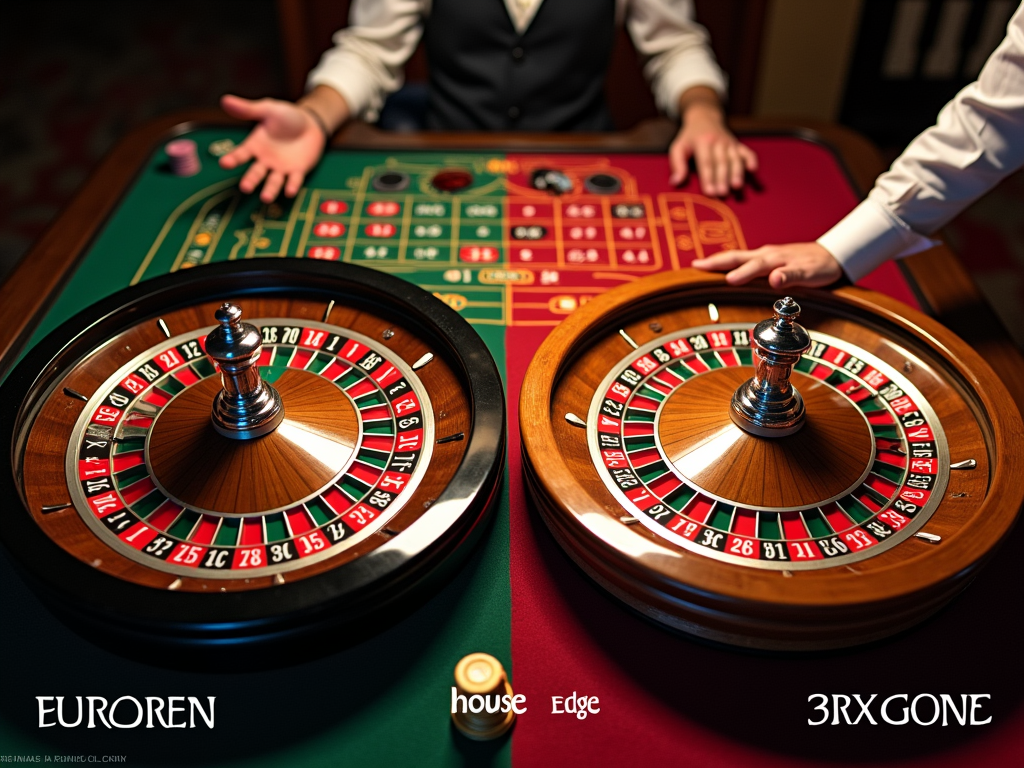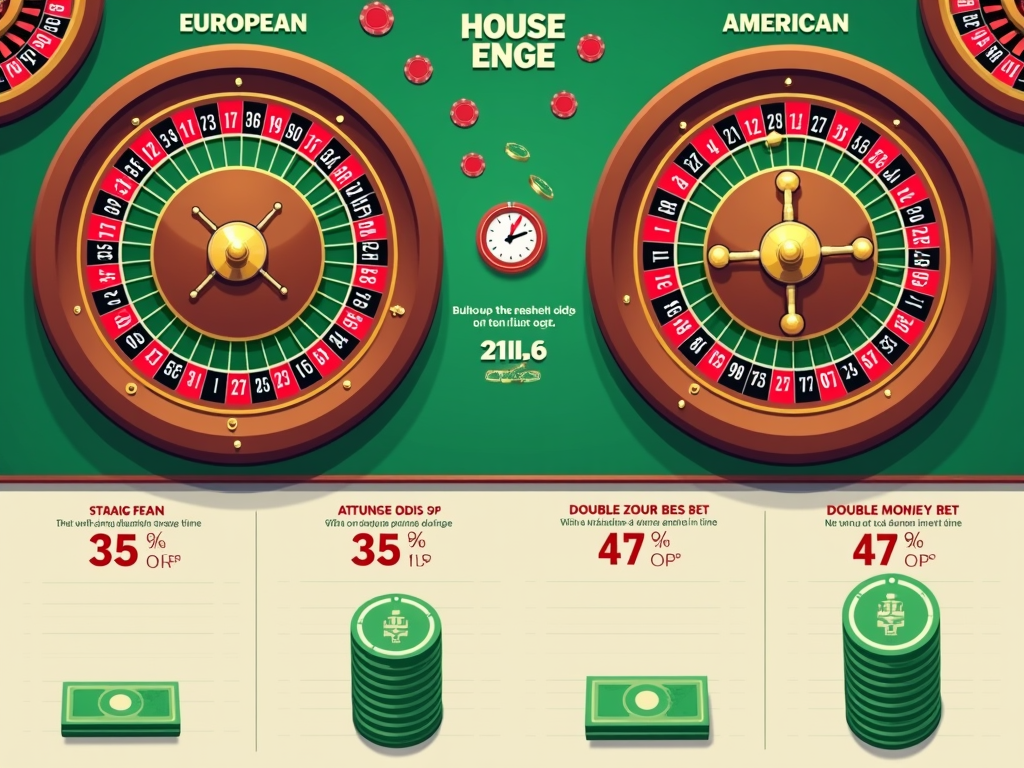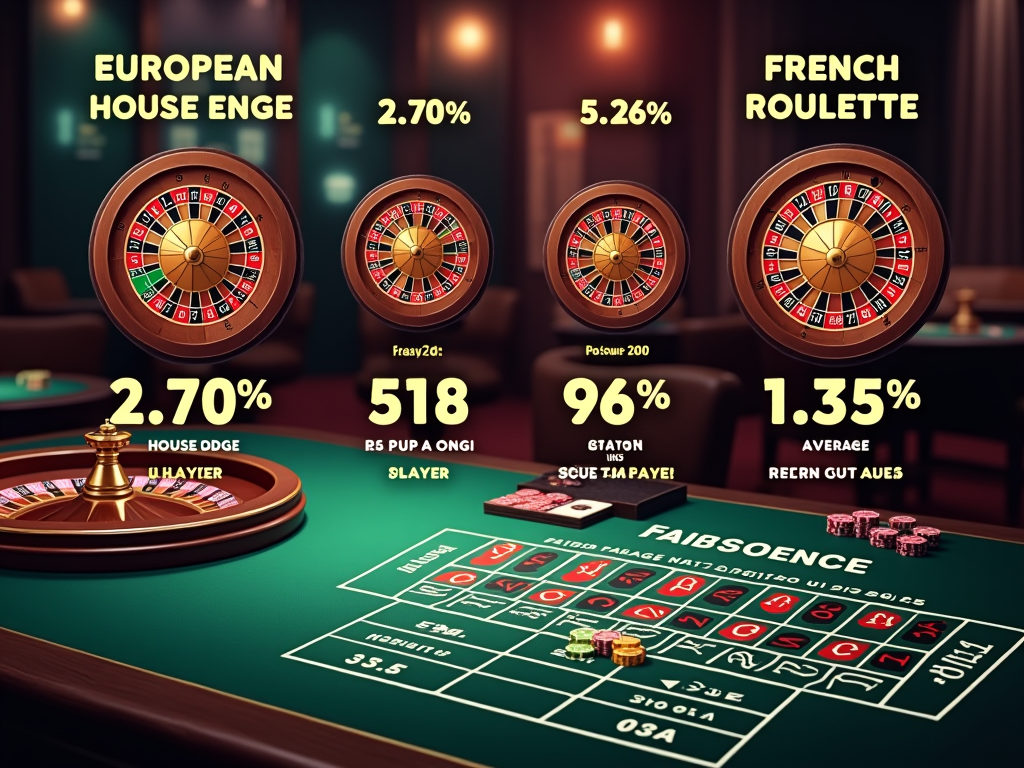The Mathematics Behind Roulette’s Casino Advantage
Roulette creates a consistent casino advantage through straightforward math, ensuring long-term profits for the house in both European and American versions. The key factor driving this edge is the number of zero pockets on the wheel, which alters the odds and payouts of all bets.
Zero Pockets and House Edge Differences
The presence of the zero pockets is what gives the casino its built-in advantage:
- European roulette features a single zero pocket (0), resulting in a 2.70% house edge.
- American roulette includes both a single zero (0) and a double zero (00), pushing the house edge up to 5.26%.
This discrepancy is entirely mathematical. With more zero pockets, the odds shift further in favor of the casino while payouts to winning players remain the same.
French Roulette: Better Odds for Players
French roulette provides players with the best odds thanks to the La Partage and En Prison rules, which apply to even-money bets like red/black or odd/even.
- La Partage: If the ball lands on zero, players lose only half their even-money bet.
- En Prison: Even-money bets are “imprisoned” on a zero spin. If the next spin wins, the player gets the full bet back.
These rules reduce the house edge to just 1.35% on affected bets, making French roulette the most player-friendly variation.
Fixed House Edge Regardless of Strategy
The house edge remains constant no matter the size of the bet or the strategy used. Betting systems like Martingale or Fibonacci may create short-term excitement, but they do not change the expected value of each bet.
How Casinos Maintain Profitability
Casinos ensure long-term profitability by offering fixed payouts that are slightly worse than the true odds. For instance:
- A bet on a single number pays 35:1, even though the true odds are 36:1 in European roulette and 37:1 in American roulette.
This mathematical structure guarantees a reliable edge over the long term, even though players may win during individual sessions.
Summary of Key Takeaways
- European roulette has a 2.70% house edge due to one zero pocket, while American roulette‘s extra zero raises it to 5.26%.
- French roulette, utilizing La Partage and En Prison rules, lowers the house edge to 1.35% on even-money bets.
- The house edge does not fluctuate with bet size or betting systems.
- Roulette payouts are designed to be slightly worse than actual probability, ensuring consistent casino profits over time.
- The math guarantees long-term statistical losses for players, despite the possibility of short-term wins.
This breakdown highlights the critical mathematical elements that shape casino advantage in roulette, helping players understand how odds, payouts, and game variations affect their potential returns.
Making Sense of the Casino’s Mathematical Advantage
I’ll break down the casino’s house edge in simple terms – it’s the built-in mathematical advantage that gives casinos their consistent profits in casino games like roulette. This edge operates as a small but steady percentage that works in the casino’s favor on every bet placed.
How the House Edge Works in Practice
Think of the house edge as a slight tilt in the playing field. While you might win or lose on any single spin of the roulette wheel, this small mathematical advantage ensures the casino profits over thousands of spins and bets.
Let’s put this into perspective with real numbers. In European roulette, the house edge stands at 2.70%. This means that for every $100 wagered, the casino expects to keep $2.70 as profit over the long term. The flip side of this equation is the Return to Player (RTP) rate of 97.30% – the amount players can expect to get back from their wagers over time.
Here’s what makes the house edge so effective:
- It applies to every bet, regardless of size
- It works independently of betting systems or strategies
- The edge compounds over multiple bets
- Short-term variance doesn’t affect its long-term reliability
I want to stress that the house edge doesn’t predict what will happen in your individual gaming session. You might walk away a winner on any given day – that’s what makes roulette exciting. But over many thousands of spins, the mathematical advantage becomes clear and consistent.
The beauty of understanding the house edge lies in its transparency. By knowing exactly what percentage advantage the casino holds, I can make informed decisions about my betting strategy and bankroll management. It’s this predictable nature of the house edge that has made roulette a casino staple for centuries.
European vs American Roulette: A Tale of Two Wheels
Looking at a roulette wheel, you might think they’re all created equal. But there’s a significant difference between European and American roulette tables that can impact your chances of winning.
Key Differences Between the Wheels
The European roulette wheel contains 37 slots – numbers 1 through 36 along with a single zero (0). In contrast, the American version adds an extra slot with its double zero (00), bringing the total to 38 pockets. While this might seem like a minor variation, it creates a meaningful difference in the odds.
Here’s what makes these differences matter in practice:
- The European wheel’s house edge sits at 2.7% due to its single zero
- American roulette’s extra double zero pushes the house edge up to 5.26%
- Both versions maintain identical payouts (35:1 for straight-up bets)
- The number sequence and color distribution remain consistent across both wheels
- European wheels generally offer better long-term winning potential
This means that if you’re placing bets in roulette, you’ll find better odds at European tables compared to their American counterparts. For example, if you bet $100 on a European wheel, you’re likely to lose $2.70 on average over time. The same bet on an American wheel would cost you $5.26 on average.
I find it fascinating that despite these different configurations, casinos maintain the same payout structure for both versions. The addition of that extra double-zero pocket in the American version simply increases the casino’s advantage without offering any additional benefits to players.
The betting layout on the table reflects these differences, with the American version including an extra betting space for the double zero. However, all other betting options – from straight-up bets to dozens and columns – stay consistent between the two variations.

Why European Roulette Gives You Better Odds
I’m always direct with players about casino mathematics – European Roulette stands out as the smarter choice compared to other roulette betting variations thanks to its more favorable house edge of 2.70%.
Understanding the European Roulette Edge
The math behind European Roulette’s house advantage is straightforward. With 37 total slots but only 36 paid slots, the casino maintains a slim edge calculated by dividing 1 by 37. Let’s break this down with a practical example: If you place a €10 bet on Red repeatedly, you’re working with 18 red slots, 18 black slots, and that single green zero. Your true odds of winning are 18 out of 37 spins.
Here’s what this means in practice: Over 37 spins at €10 each, you’d:
- Wager a total of €370
- Win back €360
- Net loss of €10 (precisely 2.70% of your total wagers)
The American Roulette Difference
I recommend staying away from American Roulette when possible. Its additional ’00’ slot nearly doubles the house edge to 5.26% compared to the European version. Even worse, the Five Number Bet in American Roulette pushes the house edge up to 7.89% – making it one of the least favorable casino game options.
Players should note that these differences in house edge percentages can significantly impact their bankroll over time. A lower house edge means your money typically lasts longer, giving you more spins and entertainment value. The extra green slot in American Roulette might seem like a small change, but it makes a substantial difference to your odds of winning.
The casino’s mathematical advantage is constant regardless of betting systems or strategies – that’s why I always emphasize choosing European Roulette for its better odds. This choice alone can help preserve your bankroll while maximizing your chances of winning sessions.
How Casinos Build Their Edge Into Payouts
The casino’s mathematical advantage in roulette betting strategies starts with how they structure their payouts. I’ve found that straight-up bets perfectly showcase this built-in edge – while the true odds are 36:1 on European wheels and 37:1 on American wheels, casinos consistently pay out only 35:1 on both variants.
Understanding the Edge in Different Bet Types
Even-money bets paint a clear picture of how this edge impacts your chances. On a European wheel, your winning probability sits at 48.65%, while the American wheel drops that to 47.37%. This might seem like a small difference, but it adds up quickly when you’re playing popular casino games.
Let’s break down what this means for your bankroll with some specific examples:
- Playing European Roulette with $100 bets leads to an average loss of $2.70 over time
- The same $100 bet on American Roulette results in a higher average loss of $5.26
- Single-number bets get paid at 35:1 instead of the true odds of 36:1 (European) or 37:1 (American)
- The extra 0 slot on European wheels and additional 00 on American wheels create this edge
- Each bet type maintains this edge through carefully calculated payout ratios
This gap between true odds and payout odds forms the foundation of the casino’s advantage. The house edge stays consistent across all betting options, though it manifests differently depending on your chosen wager type. I recommend sticking to European Roulette when possible, as it offers nearly twice the value in terms of statistical advantage compared to its American counterpart.

French Roulette’s Special Rules Cut the Edge in Half
I’ve found that French Roulette stands out as the most player-friendly version of roulette betting options thanks to its unique rules. The game’s special features – La Partage and En Prison – make a real difference in reducing the house advantage.
Understanding La Partage and En Prison
La Partage acts as a safety net for players making even-money bets. If the ball lands on zero, you’ll only lose half your wager instead of the full amount. This rule applies to outside bets like Red/Black, Odd/Even, and High/Low (1-18/19-36).
En Prison offers another helpful option when zero appears. Your even-money bet gets “imprisoned” or held for the next spin, giving you a second chance to win back your original wager. Here’s what makes these rules so valuable for players:
- They cut the house edge to 1.35% on even-money bets – half of what you’ll find in other roulette variations
- They only activate on outside even-money wagers
- You can use them repeatedly if zero keeps appearing
- They don’t affect other bet types on the casino games layout
I’ve noticed that many players don’t realize how significant this reduction in house edge really is. At 1.35%, French Roulette offers better odds than nearly any other casino table game. The catch? These advantageous rules only work with even-money bets – your straight-up numbers and other inside bets still face the standard house edge.
These player-friendly features explain why experienced gamblers often seek out French Roulette tables. You won’t find these rules in American or European versions, making French Roulette uniquely appealing for smart players looking to maximize their potential returns.
Remember that while these rules improve your odds, they don’t eliminate the house advantage entirely. I still recommend sticking to a solid betting strategy and managing your bankroll carefully, even with these favorable conditions in place.
Sources:
Investopedia Staff, Investopedia – Article: House Edge Definition
Benjamin James, Techopedia – Article: American Roulette
Staff Writer, Casino org – Article: European Roulette: Play The Best Odds Roulette Online
John Grochowski, UNLV Center for Gaming Research – Article: How Casino Games Work: Roulette





